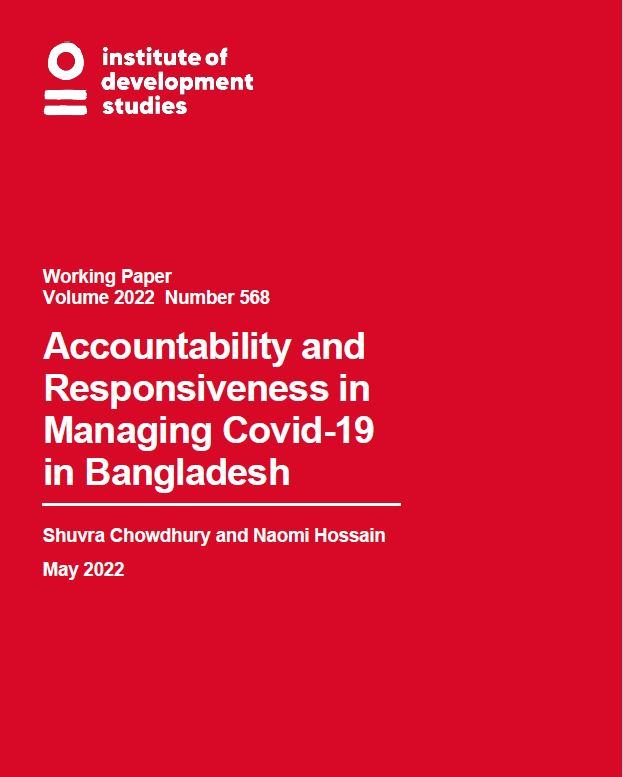
Accountability and Responsiveness in Managing Covid-19 in Bangladesh
Date: May 2022
Author(s): Shuvra Chowdhury and Naomi Hossain
Publication type:
Published by: Institute of Development Studies
This Working Paper reports on the mechanisms and processes through which the Bangladeshi government listened to citizens’ needs, and citizens held government accountable for its policy responses to the Covid-19 pandemic. It explores both official and governmental mechanisms, and non-state and informal mechanisms. The paper sets out the political context within which accountability and responsiveness mechanisms have been operating in Bangladesh, and the range of governmental innovations with respect to citizen participation, transparency, and accountability that have happened despite a closure of civic space. These mechanisms can be expected to have affected the quality and success of the government’s Covid-19 response, but there is as yet little evidence of how they operated during the pandemic. The study found that despite the official imperative to control the narrative on Covid-19, media coverage and technocratic and evidence-based analysis and advocacy played some role in influencing government action. Overall, the government demonstrated some willingness to listen to citizens’ concerns, because such information is seen as essential for improving the performance of public policies. Yet this willingness came up against the limits of the government’s tolerance for scrutiny and open critique of its policies.
Shuvra Chowdhury is Associate Professor in the Department of Public Administration at the University of Rajshahi. Dr Chowdhury is the author of Gender Responsive Budgeting in South Asia: Experience of Bangladeshi Local Government (Routledge, 2021) and Strengthening Local Governance in Bangladesh: Reforms, Participation and Accountability (SpringerLink 2018), both
co-authored with Professor Pranab Kumar Panday. Naomi Hossain is a political sociologist, who is currently a Research Professor at the Accountability Research Center in the School of International Service at American University in Washington DC. She was previously employed by BRAC Research and Evaluation Division in Bangladesh, and the Institute of Development Studies at the University of Sussex in the UK. Her research focuses on the politics of development, and she has written extensively about Bangladesh, disasters, protests, and women’s empowerment. She is the author of The Aid Lab: Understanding Bangladesh’s Unexpected Success (2017, Oxford University Press). Naomi’s work can be viewed here: https://nomhossain.com/.
